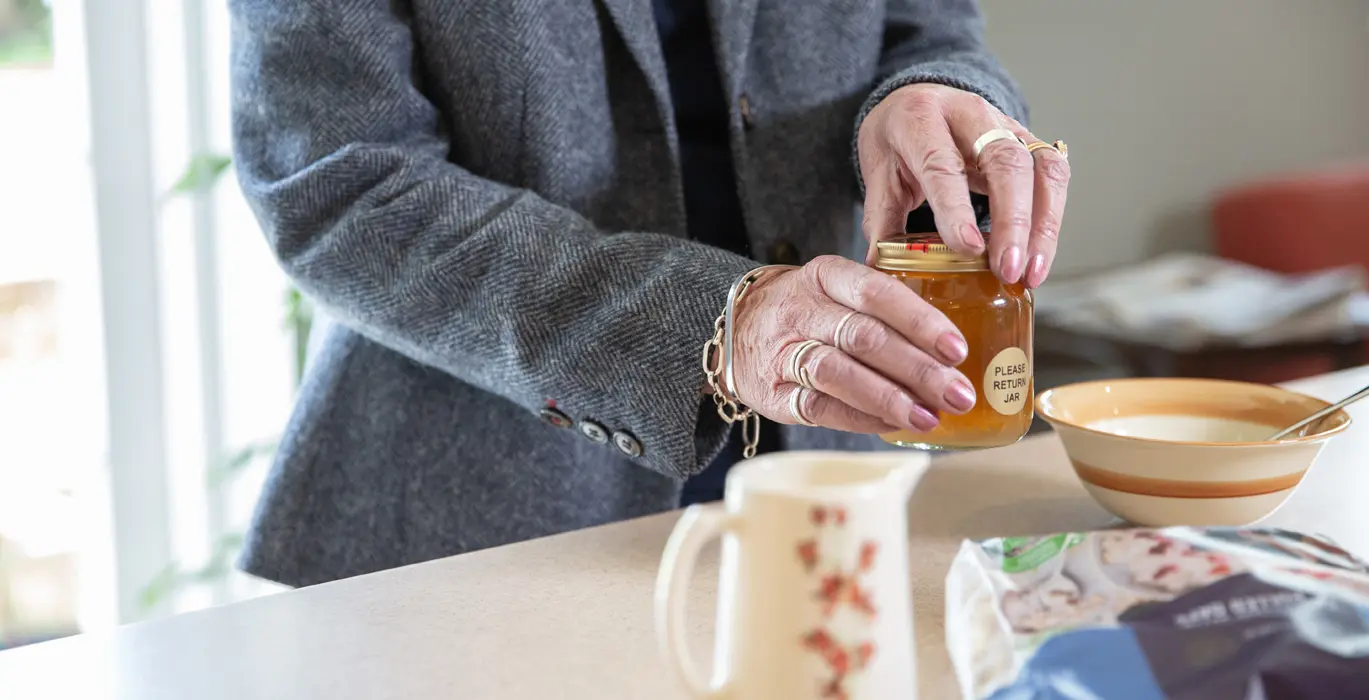Sitting down for a delicious meal, taking a sip of a nice cup of tea, or working your way through a crisp pint on a summers day are some of the most pleasurable things in life, and often taken for granted.
Sitting down for a delicious meal, taking a sip of a nice cup of tea, or working your way through a crisp pint on a summers day are some of the most pleasurable things in life, and often taken for granted.
But eating and drinking can become challenging for those with dementia. It’s really important to make sure your loved one eats a healthy diet to give them the best chance of living well with their condition.
Not eating enough can lead to malnutrition, weight loss, weakness and infection. And not drinking sufficient fluids can cause dehydration, which can be serious.
Why is eating and drinking affected in dementia?
Dementia can lead to loss of appetite for a number of reasons. The person could have painful teeth and gums but find it hard to communicate to their carers that their mouth hurts.
Depression, which is common in people with the condition, could also be the cause.
Medication for dementia can often cause poor appetite as a side effect. Fatigue and poor concentration (common symptoms of the condition) can also lead to problems at mealtimes.
Dehydration too can be a serious consequence for people with the illness. The person may not be able to effectively communicate that they are thirsty, or they may just forget to ensure they’re drinking appropriately throughout the day. Dehydration can make symptoms of confusion more severe, and also cause constipation, headaches and UTIs.
How can you help?
Luckily, there’s plenty you can do if you’re worried your loved one isn’t eating or drinking enough. But remember, your relative may not want to accept help at first. It’s important to help them maintain as much independence as possible. Be patient, and don’t put pressure on them to eat everything on their plate if they don’t want to.
Try and make mealtimes as light and positive as possible; creating a calming eating environment is a must. And let the person with dementia lead with regards to timing and settings. Ask them when they’d most like to eat and where they’d prefer to sit.
Common eating and dementia scenarios – and how to solve them
They refuse food
If your relative has stopped eating, it can be incredibly distressing for you as a carer. But take comfort that this problem is common. Think about the possible reasons for this first – are they depressed, in pain, tired or confused?
People with dementia may struggle to recognise food and drink which can mean dinner goes uneaten. So do ensure your loved one is not experiencing problems with their sight. If they usually wear glasses, make sure they wear them at mealtimes. Explain to them what’s on their plate so it feels familiar to them.
Don’t overload the plate either – you don’t want to overwhelm them. Keep portions small, and choose food that’s easy to eat. Eating may take longer now, so don’t assume they’ve finished just because they’ve paused. Allow them to take their time.
They can’t cut their food up
As dementia progresses, motor skills can be affected. This can lead to problems comfortably sitting at the dining table and make using cutlery more challenging.
Chop up your loved one’s food so they don’t have to get frustrated trying to cut it themselves. Spoons may be easier to eat with than forks. Alternatively, try introducing more finger foods to regular mealtimes and see if the person finds these easier and more appealing to eat.
There are also plenty of aids available that can make mealtimes easier for someone with dementia, such as specially adapted cutlery and non-spill cups.
They’ll only eat dessert
If you find the person frequently ignores their meat and two veg but will happily accept the ice cream course, don’t fret. Dementia can change our perception of taste, so it may just be that your loved one prefers the taste of sweet foods these days.
Don’t stop them eating dessert and try and incorporate sweeter savoury foods into the main meal, such as sweet potatoes and caramelised onions.
Their food goes cold
Your loved one may not be able to eat as quickly as they once did, which means their food could be cold by the time they’re halfway through the meal. Understandably, lukewarm food can be unappealing.
If this is a problem, try giving the person half their portion and save the remainder to be heated up in the microwave (or kept warm in the oven) for when they’ve finished the first half.
They have problems chewing
Someone with dementia may have problems chewing their food. That could be because they simply forget to do it enough times to swallow easily. Or, they may have pain in their mouth that they haven’t communicated.
Soft foods can be brilliant. Try soups, smoothies and mashed potato. But make sure your loved one has regular dental checkups to ensure it’s not problems with their gums or teeth that are affecting their eating.
They’re not drinking enough
How we experience thirst changes as we get older. Regardless of whether someone has dementia or not, getting enough fluid can become more challenging as we age.
Make sure your loved one is encouraged to drink regularly throughout the day. Draw attention to the glass in front of them at mealtimes.
If they don’t want to drink plain water, that’s absolutely fine. Tea and coffee, fruit juice and soup all count towards their fluid intake. Take a look at the cups you want them to drink from and ensure they’re not too heavy or difficult to hold.
They’re overeating
Sometimes people with dementia actually end up eating too much. They may have forgotten they recently ate or appear worried about where their next meal is coming from. This is seen most frequently in frontotemporal dementia and, while malnutrition may be less of a worry, can still be concerning.
Make sure there are healthy snacks available in their home, and your loved one isn’t overeating due to lack of stimulation. Offer them a drink instead of more food if they say they’re still hungry after eating.



